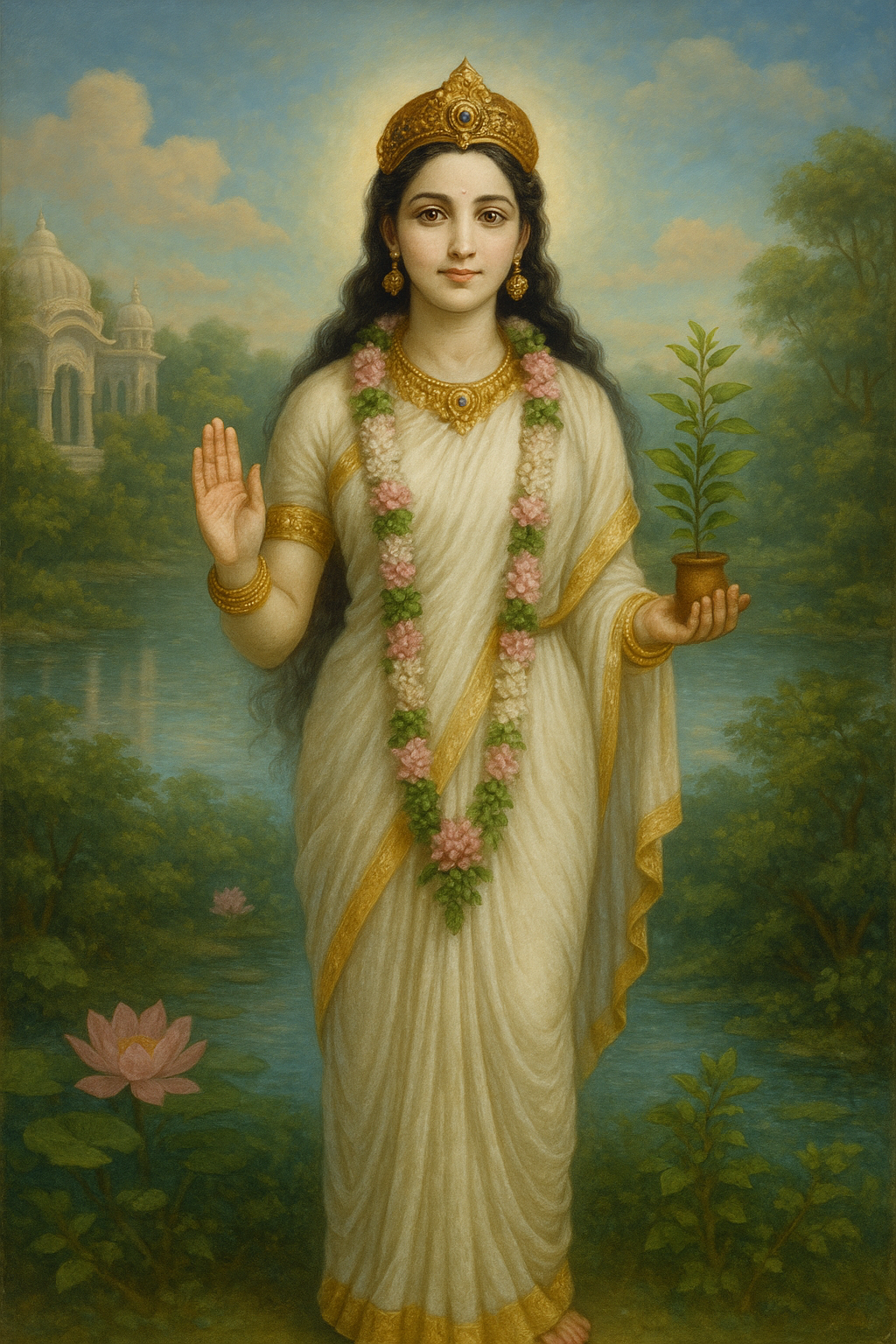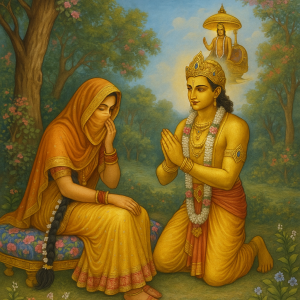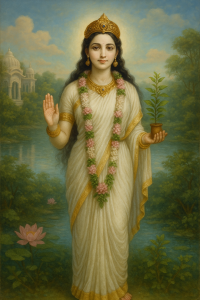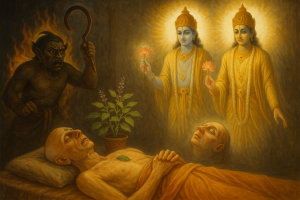A Sage’s Divine Inquiry
Once, the great sage Nārada approached Lord Nārāyaṇa with deep longing to understand a sacred mystery. Bowing with folded hands, he inquired:
“O Lord of all beings, how did the supremely pure and chaste Tulasī Devī become Your wife? Where was she born? Who was she in her previous life? What kind of family did she descend from, and what austerities did she perform to be worthy of becoming Your consort—You, who are the transcendental Lord, above the material energy, all-knowing and unchanging? And how did such a glorious personality take the form of a tree?”
Hearing this sincere inquiry, Lord Nārāyaṇa, the protector of devotees, began to speak.
The Line of Sacred Kings
Lord Nārāyaṇa described the lineage of great kings. In ancient times, there was a noble soul named Manu Dakṣa Sāvarṇi, a partial expansion of Lord Viṣṇu Himself. He was virtuous and devoted to the Supreme Lord, famed across the worlds for his piety. His son, Dharma Sāvarṇi, inherited these qualities and was followed by Viṣṇu Sāvarṇi, a steadfast Vaiṣṇava. Viṣṇu Sāvarṇi’s son, Rāja Sāvarṇi, was also righteous.
But in the next generation came a significant change. Rāja Sāvarṇi’s son, Vṛṣadhvaja, became intensely devoted to Lord Śiva, to the extent of rejecting all worship of Lord Nārāyaṇa and other demigods. He abolished the worship of Goddess Lakṣmī during the sacred month of Bhādra and of Sarasvatī during Māgha. He refused to perform or support any worship connected to Lord Viṣṇu, and even harshly criticized those who did.
The Curse of the Sun-God
While other demigods tolerated his behavior out of fear of Lord Śiva, the sun-god Sūrya could not bear such offenses against Lord Viṣṇu. He declared a curse:
“O King, just as you refuse to recognize any deity other than Lord Śiva, you shall now lose all your prosperity and wealth.”
The Wrath of Śiva and the Demigods’ Flight
Upon hearing of the curse, Lord Śiva’s fury ignited. Grasping his terrible trident, he rushed after Sūrya. Terrified, Sūrya fled with his father Kaśyapa Muni to Brahmaloka, seeking protection from Lord Brahmā. But even there, Śiva followed. Alarmed, Brahmā guided them to the eternal spiritual realm of Vaikuṇṭha, where they approached Lord Nārāyaṇa and fell at His lotus feet, trembling with fear.
The Supreme Shelter
Lord Nārāyaṇa comforted them with His sweet and soothing words:
“O demigods, why should you fear while I am present? Wherever My name is remembered in difficulty, I arrive with My Sudarśana cakra to protect My devotee. Know that I am the creator, sustainer, and destroyer. I manifest as Viṣṇu to preserve, as Brahmā to create, and as Śiva to annihilate. All forms are within Me.”
He glorified Lord Śiva, declaring him His dear devotee and an embodiment of auspiciousness, and promised that nothing but good would come to those who took shelter of Him.
As He spoke, Lord Śiva arrived, eyes red with passion, seated on his bull. Dismounting, he offered heartfelt obeisances to Lord Nārāyaṇa and then to Lord Brahmā. In turn, Sūrya and Kaśyapa bowed to Lord Śiva.
Lord Nārāyaṇa, seated on His jeweled throne and attended by four-armed servants, received Lord Śiva with honor. Adorned with a crown, earrings, a garland, and sandalwood paste, the Lord radiated beauty like a monsoon cloud. He listened joyfully to the celestial songs and dances offered for His pleasure.
Lord Śiva was seated and fanned by attendants. Calm now, he worshiped Lord Nārāyaṇa with hymns from all five mouths.
Śiva Pleads for His Devotee
Lord Viṣṇu asked, “O Śiva, what brings you here?”
Lord Śiva replied, “My devotee Vṛṣadhvaja has been cursed by Sūrya. Out of affection, I came to protect him. O Lord, what will become of this faithful soul who has now lost all fortune?”
The Lord gently replied, “A moment here in Vaikuṇṭha equals millions of years on Earth. Vṛṣadhvaja has passed away. His son, Haṁsadhvaja, is also gone. But their sons—Dharmadhvaja and Kuśadhvaja—have turned to Lakṣmī Devī with sincere devotion. Pleased, She will soon take birth through their wives and restore their lineage and prosperity.”
With that, Lord Viṣṇu dismissed them, and each returned peacefully to their respective realms.
The Divine Birth of Tulasī
In time, Dharmadhvaja married Queen Mādhavī. She became pregnant by the grace of Lakṣmī Devī. The divine child remained in her womb for a hundred celestial years, her radiance increasing daily.
Then, on an auspicious full moon Friday in the sacred month of Kārtika, Mādhavī gave birth. The child’s feet bore lotus marks, her face glowed like the autumn moon, and her eyes were like blossoming lotuses. Her lips shone like ripe bimba fruit, her body exuded a natural fragrance, and her complexion glowed white like a champaka flower.
Her body emitted warmth in the cold and coolness in the heat. She was surrounded by a halo of light. Her beauty was celestial and unearthly. The sages named her Tulasī.
Lessons to Be Learned
1. The Lord Is the Ultimate Protector
Lord Nārāyaṇa assures the demigods, “Anyone who remembers Me in danger, I rush to protect.” Śrīla Prabhupāda teaches that remembering Kṛṣṇa is the most powerful protection. In any crisis, the first duty of a devotee is smaraṇam, remembrance of the Lord.
2. Time in the Spiritual World Is Beyond Comprehension
What is a half-hour in Vaikuṇṭha equals millions of years on Earth. The spiritual realm is eternal and untouched by time. As Śrīla Prabhupāda explains, the devotee aspires for such a timeless existence of service.
3. Devotion Must Be Without Offense
King Vṛṣadhvaja, though devoted to Śiva, offended Viṣṇu. This offense brought his downfall. Prabhupāda warns that offending the Lord or His devotees is worse than atheism and leads to suffering, even when one appears pious.
4. True Bhakti Is Inclusive and Respectful
Lord Viṣṇu honored Śiva, calling him “dearer than life.” A real Vaiṣṇava never belittles others’ devotion. We must honor all forms of sincere worship, especially those dear to Kṛṣṇa.
5. The Lord’s Plan Always Brings Good
Though Vṛṣadhvaja suffered a curse, the Lord arranged for his descendants to be blessed. This teaches us that suffering, when viewed through the lens of devotion, is often a reformative and elevating experience.
6. Great Souls Take Birth by Divine Arrangement
Tulasī Devī was not born of karma but as a partial expansion of Lakṣmī Devī. Her birth was divinely orchestrated for the Lord’s pleasure. Similarly, great devotees appear in the world to fulfill divine missions.
7. Spiritual Beauty Reflects Inner Purity
Tulasī’s form, glowing and fragrant, reflected her internal devotion and purity, not material sensuality. As Śrīla Prabhupāda often said, “Real beauty comes from purity of heart and devotional consciousness.”



